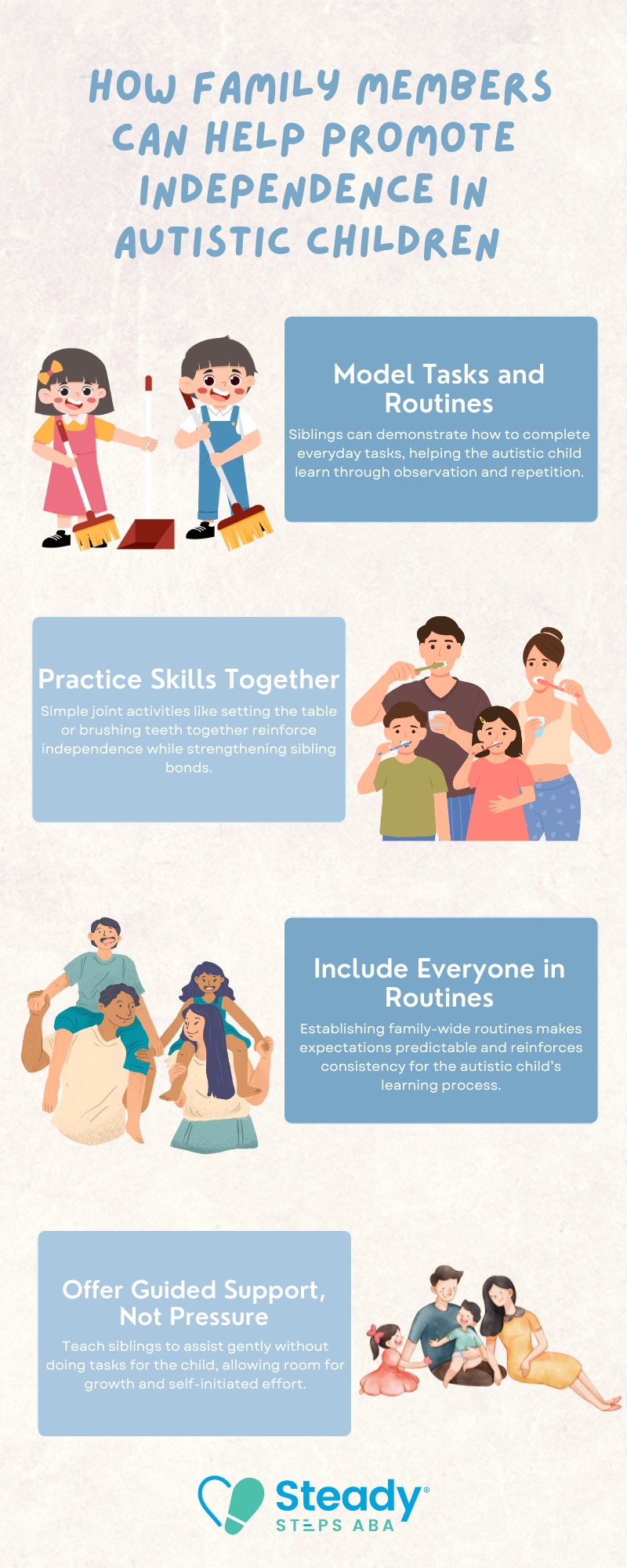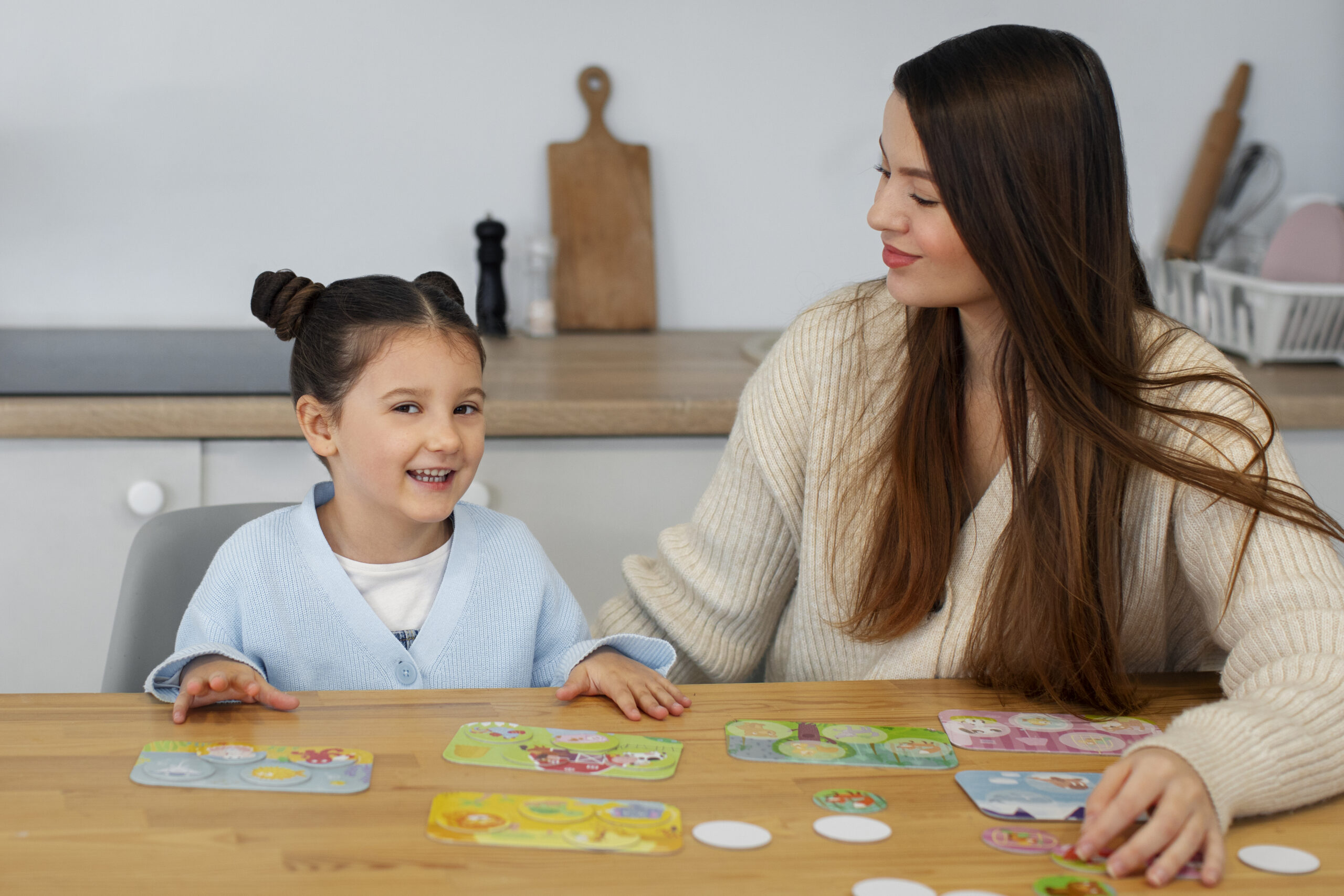Key Points:
- Building independence in autistic children involves fostering essential life skills and creating supportive environments.
- Understanding challenges and strengths can help guide your child’s development in various areas of life.
- ABA therapy is a proven method to promote independence and autism-related skill-building.
Raising a child with autism involves unique challenges, especially when it comes to fostering independence. Many individuals with autism struggle with independence even well into adulthood, with only 5% of autistic adults being able to live independently.
Because of this, many parents strive to help their children grow into self-sufficient individuals, but the journey often requires patience, understanding, and a lot of guidance. When it comes to independence and autism, it’s important to remember that each child has a different timeline and set of needs.
With the right approach, however, progress can be made in areas such as communication, daily living skills, and social interactions. It is possible for children on the spectrum to achieve a high level of independence, but it often requires tailored support and strategies that consider the individual’s strengths and challenges.
What Does Independence Mean for Children with Autism?
Independence for children with autism doesn’t necessarily mean doing everything without help. It refers to the ability to perform daily tasks, make choices, and interact with others with as little guidance as possible. These are foundational skills that, when nurtured, can help children gain confidence and contribute to their overall well-being.
Building independence in children with autism often involves breaking tasks down into smaller, manageable steps. It requires patience and a structured environment where they can practice skills repetitively until they are comfortable doing them on their own.
Autistic children may face difficulties with transitions, communication, and sensory sensitivities, all of which can affect their independence. Understanding these challenges allows you to provide the right kind of support that encourages growth while respecting their pace.
Incorporating strategies that foster independence into your child’s daily routine is key. Whether it’s teaching them to dress themselves, make simple meals, or manage personal hygiene, providing opportunities for success is vital for promoting self-confidence and a sense of accomplishment.
How Can Parents Promote Independence in Their Autistic Child?
Fostering independence in children with autism requires both time and strategic planning. While every child’s needs are different, there are general strategies that can be applied to help increase autonomy and build skills.
Here are some approaches parents can consider:
1. Use Visual Supports
Many children with autism benefit from visual supports like picture schedules or step-by-step charts. These tools can help make expectations clearer and break down tasks into manageable steps. By referring to visuals, children can learn to follow routines independently, reducing confusion and frustration.
2. Create Structured Routines
A predictable, structured environment helps children with autism feel secure. By maintaining consistent routines, children can anticipate what’s coming next and gain a sense of control over their day. For example, a morning routine that involves getting dressed, brushing teeth, and eating breakfast at the same time each day can make these tasks more manageable.
3. Promote Social Skills through Role-Playing
Social interactions can often be a challenge for autistic children. To help them navigate social situations, consider using role-playing as a tool. You can act out various scenarios, like asking for help or sharing with a friend, so they can practice in a safe environment before trying these behaviors in real life.
4. Encourage Problem-Solving
Teaching children to solve problems independently can increase their sense of autonomy. When faced with challenges, give them time to think through solutions on their own before offering help. By doing this, you empower them to feel capable of handling difficult situations.
5. Provide Positive Reinforcement
Reinforcement plays a key role in motivating children with autism to continue practicing new skills. Celebrate small successes, whether it’s completing a task independently or improving communication. Positive reinforcement, such as praise or small rewards, can strengthen the behavior and encourage further independence.
By consistently using these strategies, you can provide the support your child needs to become more independent in their daily life. However, it’s important to remember that progress might take time, and setbacks are a normal part of the process. As you navigate this journey, it’s also helpful to understand the broader societal challenges your child may face—such as bias or misunderstanding—which we explore further in What is Autism Stigma and Why Does It Still Exist Today.

What are the Key Areas to Focus On for Building Independence in Autism?
When working toward building independence for children with autism, there are several key areas to focus on. These areas often overlap, but each offers distinct ways for parents and caregivers to support growth and skill development.
Key areas to focus on include:
1. Self-Care and Hygiene Skills
Self-care skills such as dressing, bathing, and brushing teeth are essential for independence. Start by breaking these tasks into smaller steps, and gradually reduce the amount of support you offer as your child masters each one. Use visuals, timers, or reminders to keep them on track.
2. Communication Skills
Communication is central to independence. Autistic children may struggle with verbal communication or social cues, so finding alternative communication methods, such as sign language, picture exchange systems (PECS), or communication devices, can support their ability to express needs and make choices.
3. Social Skills and Interactions
Learning appropriate social behaviors, like making eye contact, greeting others, and sharing, is vital. Role-playing, as mentioned earlier, is a powerful tool to practice social interactions. Encouraging playdates or group activities can also help your child gain confidence in social settings.
4. Problem-Solving and Decision Making
Teaching your child how to make decisions and solve problems can foster their ability to act independently. Encourage them to make simple choices, like selecting their clothes or deciding what snack to have. As they grow, you can increase the complexity of decisions, helping them learn to navigate life’s challenges with confidence.
5. Life Skills and Daily Living
Life skills like managing money, grocery shopping, cooking, and using public transportation are critical for long-term independence. Start with simple tasks, like sorting items or learning to make a snack, and gradually work toward more complex skills.
Involving Siblings and Family in Promoting Independence
Fostering independence in a child with autism is not a job for parents alone. Siblings and extended family members can play a vital role in supporting skill-building, modeling appropriate behavior, and creating a home environment that encourages self-reliance.
When the entire family is aligned in their approach, it creates consistency, motivation, and a greater sense of belonging for the child. This support system also helps reduce caregiver burnout and empowers siblings to grow with empathy and responsibility.
Here are some effective ways to involve siblings and family in promoting independence:

How Can ABA Therapy Help Foster Independence for Autistic Children?
Applied Behavior Analysis (ABA) therapy is a highly effective approach for promoting independence and skill development in children with autism. ABA focuses on teaching specific behaviors through structured reinforcement techniques.
ABA therapy can address various aspects of independence, including communication, daily living skills, social behaviors, and more. Therapists use positive reinforcement to encourage desirable behaviors, breaking tasks down into manageable steps for easier learning. The goal of ABA therapy is not only to teach new skills but also to ensure that children can generalize these skills to real-life situations, contributing to their overall autonomy.
Get the Support You Need with ABA Therapy in Maryland
If you’re looking to support your child’s growth toward greater independence and success, ABA therapy can offer proven strategies for development. At Steady Steps ABA, we specialize in providing personalized ABA therapy in Maryland to help children on the autism spectrum achieve their full potential.
Our expert therapists work closely with families to create individualized plans that target key areas of independence and skill development. Whether it’s enhancing communication, building life skills, or improving social interactions, we are here to guide your child every step of the way.
Take the first step toward fostering independence for your child with autism. Contact us today to learn more about our services and schedule a consultation.






